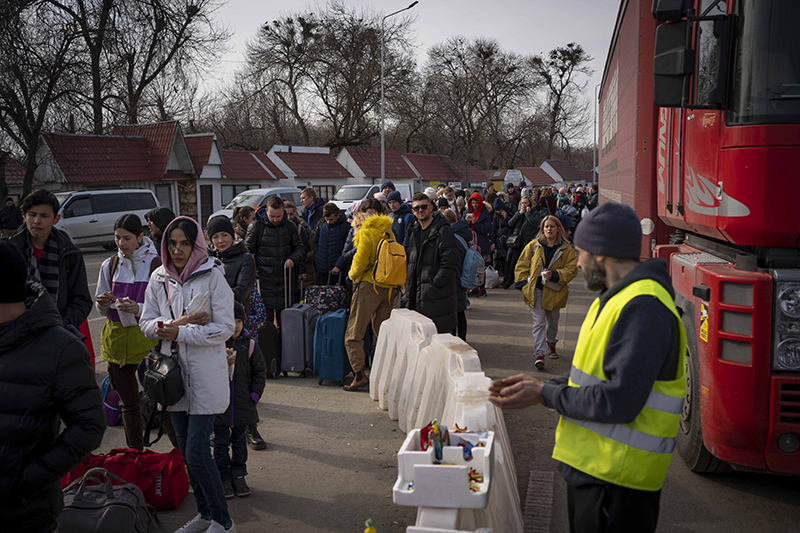The Jewish Federations of North America (JFNA) announced last week that it has surpassed its fundraising goal of $50 million for aid to Ukraine.
The funds are being allocated to 35 NGOs operating on the ground in Ukraine and neighboring countries. Some of these groups include the Jewish Agency for Israel, the American Jewish Joint Distribution Committee and World ORT, Federations’ core overseas partners, while others include the Israel Trauma Coalition, HIAS and Chabad.
The Jewish Federation of Greater Kansas City has contributed more than the “fair share” amount requested by JFNA to this total, raising some $196,000 from more than 300 community donors. That is over and above the $139,000 granted by the Federation board for emergency support, for a total of $335,000 in funding.
“Our Kansas City community has been amazing in response to the great needs of Ukrainians at this incredibly challenging time,” said Federation President and CEO Helene Lotman. “In addition to financial support, our longtime support of — and partnership with — the Romanian Jewish community has helped that community provide relief and support to thousands of Ukrainian Jewish refugees as they arrive.”
The funds from Kansas City and JFNA are being used to provide housing, clothing, cash assistance, medical attention, mental-health services, life-saving rescue operations, security and transportation for refugees, including those making aliyah to Israel. The Jewish Agency has already received almost 10,000 aliyah applications, with the numbers expected to continue rising.
The funds also went to host thousands of Ukrainian Jewish refugees for Passover Seders hosted by the Jewish Agency and JDC in Poland, Hungary, Romania, Moldova and Israel, with special Haggadot in Russian and Hebrew.
In addition to helping those fleeing Ukraine, funds are going to help those who are unable to leave, including tens of thousands of homebound elderly — many of whom are Holocaust survivors — and the disabled, in the form of humanitarian supplies, medicine and regular contact. JFNA is also helping the Ukrainian health system and NGOs in the country deal with a population that is suffering from severe psychological trauma.
A volunteer hub has been created to recruit and place hundreds of skilled volunteers over the coming months to provide essential services on the ground through partnering organizations, with 30 already having been deployed in Budapest, Warsaw and the Poland-Ukraine border.
There are currently opportunities for Russian-speaking Jewish professionals to volunteer for two to four weeks to help either online or on the ground in Ukraine to situate refugees in olim hotels to help those making aliyah, assist in meeting families at border areas of Poland, Moldova, and Romania, implement early childhood programming and provide psychological social support to families.
“Jewish Federations are unique in the key role we are playing both in providing tremendous amounts of aid to refugees as well as advocating for refugee resettlement,” said JFNA President and CEO Eric Fingerhut. “This crisis will unfold in ways which nobody can predict, but what is sure is that Jewish Federations will continue to play a frontline role in the response and long-term strategy development in order to alleviate suffering and help refugees rebuild their lives.”
According to JFNA, the work of the partner organizations includes 34,000 people served through the JDC; 2,414 people who have received medical assistance; 12,276 people who have been evacuated to other countries; 4,000 treated at Israel’s field hospital; 11 emergency hotlines fielding more than 55,000 calls; more than 11,500 immigrants to Israel from Ukraine and Russia; and 18 facilities operating at five border crossings.
JFNA has also been working within the U.S. to help expedite family reunification for refugees. In March, Jewish Federations mobilized 376 national and local faith organizations to urge the Biden administration to expedite admissions for Ukrainians with close family ties in the U.S. so they can wait here in safety along with their families. On March 24, President Joe Biden announced that the U.S. would welcome up to 100,000 Ukrainians.
